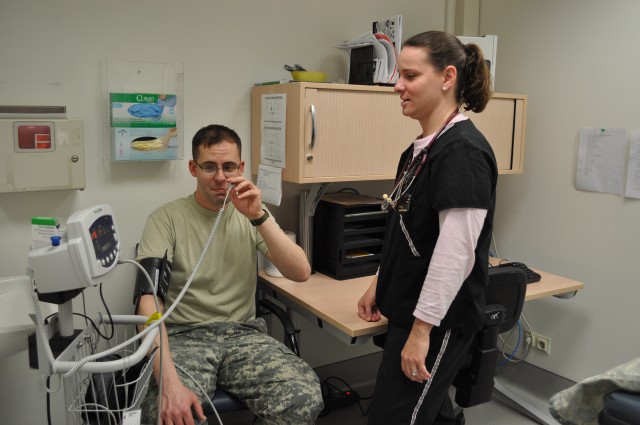
BAMBERG, Germany - The U.S. Army is a melting pot of nationalities. Within this pot there are different languages, cultures and traditions. Jennifer Mezzomo-Dempsey uses her gift of Spanish and Portuguese languages to keep her culture alive in Bamberg, Germany.
"There are many Hispanic wives and patients here that feel more comfortable speaking their native language," said the registered nurse who works at the Bamberg Army Health Clinic. "I am able to accommodate and translate for every nurse and doctor here at the clinic. And I have become a resource for people in the community that struggle with the English language."
Dempsey is a first-generation American born to immigrant parents from Brazil and Cuba. She was born in Queens, N.Y., but grew up in Miami, an experience she said helped her adapt to living in Europe.
"Miami offered a very diverse culture with subcultures from many different countries," she said. "This allowed me to learn to live and work with different customs and lifestyles. Moving to Europe was easy since I was already used to adapting to different people and environments."
Although she works in Army health care, her first exposure to the U.S. Army was in 1992 when Hurricane Andrew hit Miami.
"There were several National Guard units helping with recovery," Dempsey said. "I volunteered in Homestead to help feed the homeless and the National Guard was there doing the same."
Years later, she and her husband decided it was time for a career change and they looked into working for the Army in Europe.
"My husband is active-reserve and had been stationed in Germany two times before," she said. "We really like Germany and decided this is where we should come. And working for the Army is a great way of supporting troops and the mission during wartime."
Dempsey works not only as a registered nurse, but also as a team lead; as the co-immunization nurse; the co-Exceptional Family Member Program nurse; the pediatric leader; and the occupational health nurse. Although she wears many hats, she said it's a family effort in the clinic.
"I am able to work with a diverse group of people that truly care about their customers," she said. "An Army nurse, whether military or civilian, is part of a family. This family goes above and beyond to ensure high quality care."
Overall, Dempsey said she loves being in Europe because of her work, the travel and the cultural experience.
"I love working in Europe," she said. "The cultural diversity within the Army and living in a culture outside of my comfort zone has allowed me to grow personally and professionally."

Social Sharing